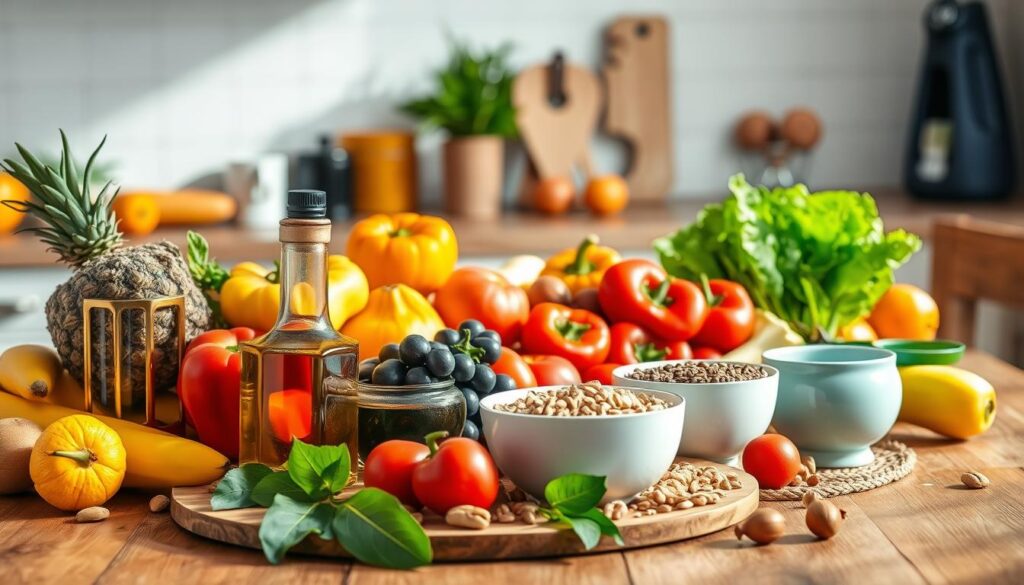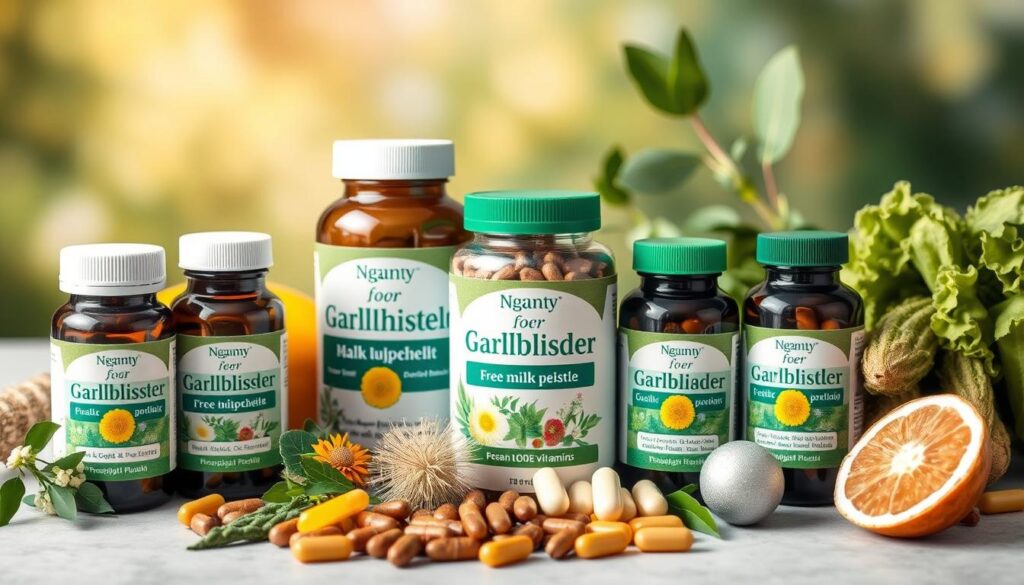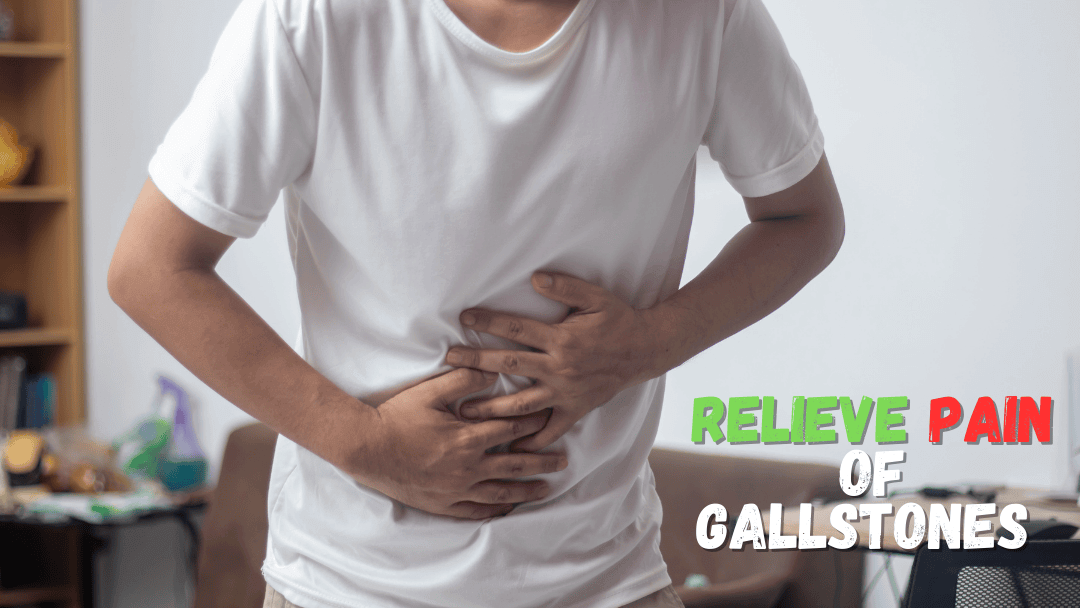Gallstone pain can be tough, but there’s hope. You don’t always need surgery to feel better. Many people in the U.S. look for natural ways to ease their gallbladder pain.
This guide will show you how to manage gallbladder pain. We’ll talk about diet changes and natural therapies. These methods can help you feel better and live healthier.
Key Takeaways
- Natural solutions can effectively manage gallstone pain
- Diet plays a crucial role in gallbladder health
- Early symptom recognition is vital for prevention
- Lifestyle modifications can reduce gallstone risk
- Consulting healthcare professionals remains important
Page Contents
- Understanding Gallstones and Their Symptoms
- Immediate Relief Techniques for Gallstone Pain
- Natural Remedies and Lifestyle Changes
- How to Relieve Pain of Gallstones Through Diet
- Essential Oils and Alternative Therapies
- Prevention Strategies and Long-term Management
- When to Seek Medical Attention
- Supplements and Vitamins for Gallstone Support
- Traditional Medical Treatments vs Natural Solutions
- Conclusion
- FAQs
Understanding Gallstones and Their Symptoms
Gallstones are hard pieces that form in the gallbladder. They cause a lot of pain and can lead to serious health issues. These stones can be different sizes and types, making it hard for people to deal with them.
Gallstones happen when bile turns into crystals. This creates blockages in the digestive system. Knowing how they form and the risks can help people spot and fix health problems early.
Common Signs of Gallbladder Attack Signs
- Sudden, intense pain in the upper right abdomen
- Sharp pain between shoulder blades
- Nausea and vomiting
- Fever and chills
- Yellowish skin or eye whites
Risk Factors for Developing Gallstones
- Obesity and excess body weight
- Age over 40
- Family history of gallstone problems
- Rapid weight loss
- Certain medical conditions
Types of Gallstones
Doctors know about two main types of gallstones:
| Stone Type | Characteristics |
|---|---|
| Cholesterol Stones | Yellow-green, most common type |
| Pigment Stones | Dark brown or black, typically smaller |
Spotting gallstone symptoms early can stop bigger problems. If you have ongoing belly pain, see a doctor. They can determine what’s wrong and make you feel better.
Immediate Relief Techniques for Gallstone Pain
Dealing with gallbladder pain is tough. But, there are quick ways to feel better during an attack. Knowing how to handle gallstone pain can really help.
When you have a gallstone attack, you need to act fast. Here are some techniques to manage your pain:
- Apply warm compress to the affected area
- Practice deep breathing exercises
- Use over-the-counter pain medications
- Rest in a comfortable position
Heat therapy is great for quick relief. A warm heating pad or hot water bottle on your right side can help. Move it in circles to feel better.
| Pain Relief Method | Effectiveness | Duration |
|---|---|---|
| Warm Compress | High | 15-20 minutes |
| Deep Breathing | Moderate | 5-10 minutes |
| Over-the-Counter Pain Medication | High | 4-6 hours |
You can consult a doctor if your pain doesn’t go away after this. These tips help for now, but you need real medical help.
Natural Remedies and Lifestyle Changes
Gallstone pain can be tough. But, natural remedies and lifestyle changes help a lot. They can ease symptoms and keep your gallbladder healthy.
Herbal Solutions for Pain Management
Herbs can help with gallstone pain. They relieve inflammation and improve your digestive system. Here are some good ones:
- Turmeric: It fights inflammation well.
- Milk thistle: It helps your liver and gallbladder.
- Dandelion root: It boosts bile production.
- Peppermint: It makes digestion easier.
Dietary Modifications
Changing your diet is key for gallbladder health. Eat foods that help your digestion and lower gallstone risk.
| Recommended Foods | Foods to Avoid |
|---|---|
| Leafy green vegetables | Saturated fats |
| Lean proteins | Processed foods |
| Whole grains | High-cholesterol foods |
| Low-fat dairy | Refined sugars |
Exercise and Movement Tips
Exercise is important for gallbladder health. It boosts metabolism, keeps weight healthy, and lowers gallstone risk.
- Walking 30 minutes daily
- Swimming
- Yoga
- Low-impact cardio exercises
Using these natural remedies and lifestyle changes can make your gallbladder work better. It can also lower the chance of painful gallstone attacks.
How to Relieve Pain of Gallstones Through Diet
Managing gallstone pain starts with knowing the right foods. A good gallstone diet can help a lot. It should focus on foods that fight inflammation and help your body heal.
Some foods can make gallstone symptoms worse. Knowing which meals to avoid is essential.
Foods to Avoid with Gallstones:
- Saturated and trans fats
- Processed meats
- Refined sugars
- High-cholesterol foods
An anti-inflammatory diet for gallbladder health should include foods that heal. These foods should be full of nutrients and help fight inflammation.
| Food Category | Recommended Foods | Benefits |
|---|---|---|
| Fruits | Berries, Citrus, Apples | Rich in antioxidants, reduces inflammation |
| Vegetables | Leafy greens, Broccoli, Cauliflower | Supports digestive health, low in fat |
| Proteins | Fish, Lean Chicken, Legumes | Provides essential nutrients, reduces inflammatory responses |
By following these dietary tips, you can make a gallstone diet that helps with pain. For guidance that works for you, always consult a healthcare expert.
Essential Oils and Alternative Therapies
Looking into other ways to treat gallstones can help. Essential oils might be a good choice for gallbladder health. They can help with symptoms of gallstones too.
Best Essential Oils for Gallbladder Support
Some essential oils might help with gallbladder health. Peppermint, lemon, and lavender oils are good for natural pain relief.
- Peppermint Oil: Helps reduce inflammation and supports digestive health
- Lemon Oil: Supports liver and gallbladder function
- Lavender Oil: Provides pain relief and stress reduction
Safe Application Methods
It’s important to use essential oils the right way. Mixing them with a carrier oil and using them carefully is best.
- Topical Application: Dilute with carrier oil before applying to abdomen
- Aromatherapy: Use diffuser or inhale directly
- Massage: Gentle abdominal massage with diluted essential oils
Always talk to a doctor before trying essential oils for gallstones. They can help but don’t forget to follow doctor’s advice.
Prevention Strategies and Long-term Management

To keep your gallbladder healthy, you need to act early. You can lower your chance of getting gallstones by making smart lifestyle choices. These choices help keep your gallbladder working well for a long time.
There are many ways to prevent gallstones:
- Eat healthy foods to keep a good weight
- Move your body with exercise
- Select foods that are high in nutrients and low in fat.
- Drink lots of water and herbal teas
- Check your cholesterol levels often
Your diet is very important in preventing gallstones. Eating foods that are good for your digestion and reduce inflammation is key. Foods like whole grains, lean proteins, and lots of fruits and veggies can help a lot.
Going to the doctor regularly is also key. You should see your doctor every year for check-ups. Ultrasound tests can help find any gallbladder problems early, before they get worse.
Managing stress is also important. Stress can make gallstones worse. Try activities like meditation, yoga, or deep breathing to help your digestion and reduce stress.
- Practice stress reduction techniques
- Get regular health screenings
- Maintain a consistent exercise routine
- Eat a balanced, nutrient-dense diet
By using these prevention strategies, you can take care of your gallbladder. This helps avoid painful gallstone attacks.
When to Seek Medical Attention
Gallstone problems can get worse fast and need quick doctor help. Knowing the key signs helps you stay safe and avoid big health issues.
It’s important to know when to go to the doctor for gallstones. Some cases need fast help to avoid serious problems.
Emergency Warning Signs
- Intense abdominal pain lasting more than 5 hours
- High fever accompanied by chills
- Yellowing of skin or eyes (jaundice)
- Persistent nausea and vomiting
- Severe chest or right shoulder pain
Treatment Options Available
Doctors have many ways to treat gallstones. They pick the best one for you based on your health.
| Treatment Method | Procedure Details | Recovery Time |
|---|---|---|
| Laparoscopic Cholecystectomy | Minimally invasive gallbladder removal | 1-2 weeks |
| ERCP (Endoscopic Procedure) | Stone removal without surgery | 2-3 days |
| Medication Therapy | Dissolution of small gallstones | Ongoing management |
If you keep having gallstone problems, see a doctor. Early help and advice can stop serious issues and help you get better.
Supplements and Vitamins for Gallstone Support

Managing gallbladder health is important. We need to eat right and use supplements. Supplements can help keep our digestive system healthy and stop gallstones.
Some vitamins and natural helpers are good for the gallbladder. They might help prevent gallstones and make us feel better.
- Vitamin C: Supports bile acid production and cholesterol metabolism
- Lecithin: Helps break down fat and prevent cholesterol crystallization
- Turmeric: Natural anti-inflammatory that supports liver and gallbladder health
- Milk Thistle: Promotes liver detoxification and gallbladder function
It’s key to know how each vitamin works and if they can mix well together.
| Supplement | Primary Benefits | Recommended Dosage |
|---|---|---|
| Vitamin D | Reduces inflammation, supports metabolic health | 1000-2000 IU daily |
| Magnesium | Improves bile flow, reduces cholesterol | 300-400 mg daily |
| Omega-3 Fatty Acids | Reduces gallstone risk, supports cardiovascular health | 1000-2000 mg daily |
Consult a physician before beginning a new supplement diet. Everyone is different, and a doctor can help choose the right ones for you.
Traditional Medical Treatments vs Natural Solutions
Finding the right gallstone treatment can be tough. It’s important to know the difference between medical and natural options. This helps people choose the best way to care for their gallbladder.
There are many choices for those looking for gallstone surgery alternatives. The decision between medical and natural treatments depends on several key factors.
Comparing Treatment Effectiveness
- Medical surgical options provide immediate gallstone removal
- Natural treatments focus on long-term prevention and symptom management
- Surgical interventions guarantee faster resolution
- Holistic approaches minimize potential surgical risks
Cost Considerations for Gallbladder Treatment
| Treatment Type | Average Cost | Insurance Coverage |
|---|---|---|
| Laparoscopic Surgery | $5,000 – $17,000 | Typically Covered |
| Natural Therapy | $200 – $1,000 | Limited Coverage |
| Lifestyle Modifications | $50 – $500 | Minimal Coverage |
Natural vs medical gallstone treatments have their own benefits. Medical options are quick, while natural ones are gentler and help prevent problems. To figure out the best option for you, it is best to consult a physician.
The cost of gallbladder treatments varies a lot. Surgery is more expensive upfront but works fast. Natural treatments cost less but need ongoing effort and can prevent bigger problems later.
Conclusion
Managing gallstones naturally means making smart choices and using health strategies.You must be aware of what your body requires. Then, you can find ways to stay well for a long time.
Changing your diet, exercising, and reducing stress can help a lot. Using herbs, essential oils, and supplements can also help your gallbladder. This way, you can stay healthy and avoid big problems.
Everyone’s experience with gallstones is different. It’s good to talk to doctors while trying natural ways. You can then receive advice that suits you.
Being healthy with gallstones is about living a balanced life. Keep learning, be patient, and focus on both symptoms and causes. This is the key to managing gallstones well.
FAQs
What are the most common symptoms of a gallstone attack?
Symptoms include sharp pain in the upper right belly. You might also feel back pain, nausea, and vomiting. Sometimes, you might even have a fever.
Can natural remedies really help manage gallstone pain?
Yes, natural remedies can help. Try changing your diet, using herbal supplements like milk thistle, and applying heat. Doing exercises can also help. But, always talk to a doctor first, especially if the pain is bad.
If I have gallstones, which foods should I stay away from?
Avoid foods high in fat and cholesterol. This includes fried foods and full-fat dairy. Instead, eat lean proteins, fruits, veggies, and whole grains. Choose low-fat dairy too.
How can I prevent gallstone formation?
Keep a healthy weight and exercise often. Eat fiber-rich foods and drink plenty of water. Avoid losing weight too fast. Slow changes can lower your risk of gallstones.
When should I seek medical attention for gallstones?
Get help right away if you have severe pain, keep vomiting, or have a fever. Also, watch for yellow skin or eyes, or pain that won’t let you move.
Are there any essential oils that can help with gallstone pain?
Oils like peppermint, rosemary, and lemon might help. But, always mix them well and talk to a doctor before using.
How effective are natural treatments compared to medical interventions?
Natural treatments work for mild cases and prevention. But, they can’t replace medical treatment for serious cases. Sometimes, surgery is needed.
Can weight loss impact gallstone development?
Losing weight too fast can raise your risk. Aim for slow weight loss of 1-2 pounds a week. Eat well and exercise regularly.
Are hereditary factors important in gallstone risk?
Yes, family history matters a lot. If your relatives had gallstones, you might be more likely to get them too.

